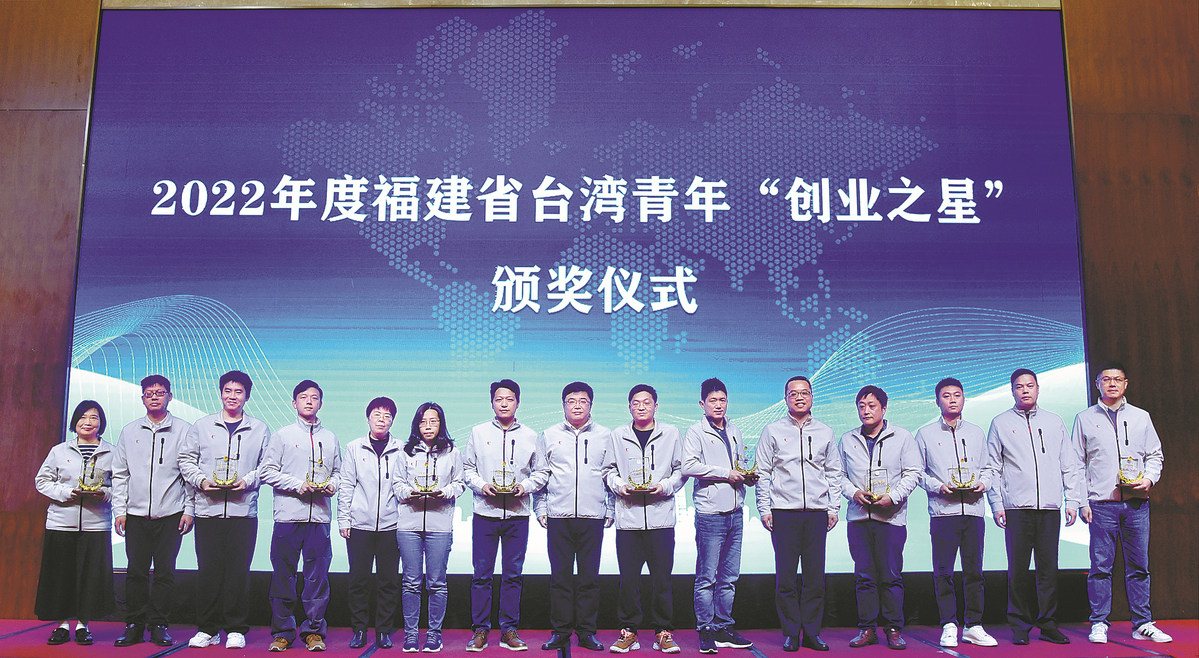Fujian helps young Taiwan entrepreneurs find footing


Program aims to encourage island residents to develop businesses on mainland
East China's Fujian province has launched this year's 101 Taiwan Youth Entrepreneurship Support Program to provide multiple channels for Taiwan youth to help drive innovation and entrepreneurship in the province, according to the Fujian Youth Federation.
Established by the Fujian Committee of the Chinese Communist Youth League in September 2015, the program has supported 145 Taiwan youth entrepreneurship projects, contributing 4 million yuan ($560,153) in total.
Since its launch, 80 young Taiwan businesspeople have been awarded the title of "entrepreneurship star".
"People from Taiwan age 18 to 45 can apply to be designated as entrepreneurship stars. To qualify, their businesses must have been registered in Fujian over the past three years," said a staff member from the provincial Taiwan youth entrepreneurship service center, adding that if the applicant's company has multiple partners, his or her share should account for over 30 percent of the business.
The program will also give a team entrepreneurship star award. Taiwan businesspeople under age 45 must comprise at least 60 percent of the team for it to qualify.
Each individual or team winner will receive 50,000 yuan to aid their business and will gain access to a series of services, including consultations, training courses and three years of mentorship. Local government departments will also help them connect with companies, media, capital and other resources, and guide them to join the province's business network.
The program gives priority to projects in the fields of digital commerce, marine economy, sustainability, cultural tourism and in key sectors concerning Fujian and Taiwan industrial cooperation.
It provides entrepreneurship training and guidance, financial support, project docking, base docking and other targeted assistance for Taiwan youth, and has organized 34 groups of over 1,000 young Taiwan people from various industries, including the service and cyberspace sectors, to visit and participate in exchanges in Fujian over the years.
More than 30 training courses and organized talks covering a variety of topics such as case counseling and project reviews have been held, attracting more than 1,600 young Taiwan people.
As a beneficiary of the program, Nan Ching-en said she has become more confident about the growth of her business in Fuzhou, capital city of Fujian, especially after she won the entrepreneurship star award in 2020. Born in 1986 in Kaohsiung, Taiwan, Nan became a piano teacher after getting her bachelor's of fine arts from National Sun Yat-sen University in 2009.
Three years later, a professor told her about a cooperative project between the university and Fuzhou, piquing her interest.
"The project aimed to develop a diverse education system by introducing fine arts teachers from Taiwan to Fujian," she said. "I knew there was a broad market for piano teaching and good prospects for its development, so I decided to seek opportunities in the city."
Nan moved to Fuzhou along with 11 other teachers and started teaching piano in an educational institution in August 2012.
During summer vacation in 2016, Nan worked with parents who wanted to help their children prepare for the prestigious Associated Board of the Royal Schools of Music exam. Those who do well earn a certificate that can help them enroll in high-level music schools.
"I still remember the parents of an 11-year-old student were anxious because they couldn't find an educational institution that could provide related training or test registration service," she said.
"There are only three exam sites on the Chinese mainland — Beijing, Shanghai and Shenzhen in Guangdong province," she added. "I am familiar with the exam as I had taken it when I was 5 years old and got my certificate."
Then Nan found a new opportunity for her to develop her own business. In 2017, Nan and her friend Yu Wan-hsuan started their own educational institution focusing on training and registering students to take the ABRSM exam. Over the next two years, they enrolled over 200 students, and 80 of them got certificates.
In the summer of 2019, to attract more students from across the country and even overseas, Nan and Yu began to develop online lessons and spent several months researching new teaching models.
They also began offering online courses for teachers who want to learn how to prepare students for the exam. In March 2020, for example, Nan held three livestream sessions to talk to other music teachers about her experience in online teaching.
So far, her institution has taught 3,300 students, including 3,000 online. Her online classes have also attracted over 30 teachers from Taiwan. "Due to family factors, most of the teachers are unable to move to Fujian," she said. "The online classes provide them a good platform to show their teaching abilities and learn more about the Chinese mainland."
Over the years, Nan has received several awards for her outstanding performance in innovation and entrepreneurship, which gave her a greater sense of responsibility to do more to promote cross-Strait exchanges.
"I have received lots of support from local government departments," she said. "I hope to do more to promote cross-Strait exchanges, such as sharing my experiences with young people in Taiwan."
- Shanghai to enhance community healthcare centers
- Shanghai continues to enrich ecological environment
- Shanghai to enhance education reform aligned with social needs
- Shanghai adds 622,000 new urban jobs in 2024
- Shanghai ramps up elderly care amid aging population
- Shanghai ramps up urban renewal to boost living quality





































